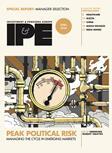PFZW, the €137bn pension fund for the Dutch healthcare industry, will conduct a “very extensive” review of its recent divestment from five Israeli banks, according to its director, Peter Borgdorff.
The pension fund has faced widespread criticism for the controversial decision, including allegations of pro-Palestinian bias.
In early January, PGGM – the manager responsible for PFZW’s assets – announced that it planned to divest from the banks over their involvement in the financing of Israeli settlements in the “occupied Palestinian territories”.
PGGM spokesman Maurice Wilbrink confirmed that the manager initiated its engagement with the banks, a process that led to their divestment, specifically at PFZW’s behest.
The divestment has proved a highly contentious one, sparking demonstrations outsides PGGM’s offices, while the Israeli government summoned the Dutch ambassador to protest the move.
In the fallout following the decision to divest from the banks, it came to light that Gert van Dijk, chairman of the PGGM council, was also a member of pro-Palestinian organisation ICCO.
Further, Cees Flinterman, who is a member of PFZW’s ethical board, is also a board member of The Rights Forum, as well as a member of the Support Committee of the Russell Tribunal on Palestine, organisations that have been accused of having an anti-Israel agenda.
Since then, Borgdorff has confirmed in his blog that pro-Palestinian organisations Cordaid, ICCO, IKV PaxChristi, Oxfam Novib, Watershed Working Group and the Dutch Palestine Komite, among others, had been actively lobbying the pension fund for “several years”, and that it incidentally provided pension funds to “some of them”.
IPE understands that PFZW was lobbied by pro-Palestinian NGOs only.
Meanwhile, ABP, Europe’s largest pension fund, announced in early February that it would not be following PGGM’s example, and that it disagreed with the manager’s assessment that the banks had acted in breach of “international law”.
In a statement, it concluded that the Israeli banks in which it invests had done nothing to violate the UN Global Compact, or give cause to initiate a formal engagement process.
In an interview with IP Nederland, Borgdorff conceded that PFZW had underestimated the extent to which its divestment would be perceived as a boycott, and confirmed the scheme would now launch a “very extensive” review of its decision-making process.
“This whole process warrants a deep and extensive review, and one of the issues that will be reviewed is how should we view all this in relation to our peers, including ABP,” he said.
“Does this mean we should change our policy to better suit the policy of others? No, we have our own policy, and we need to take our own responsibility.
“But perhaps it does mean we should devote more time beforehand to get to know the policy of others because, based on what I read in the newspapers and websites, I cannot explain the difference in policy between PFZW and ABP, and yet those policies lead to entirely different outcomes.”
When pressed by IP Nederland on Flinterman’s advisory role, Borgdorff explained that PFZW had wanted “somebody significant, somebody who is significant internationally as well”, and pointed out that Flinterman was a rapporteur on the Middle East conflict for the United Nations.
When asked whether the pension fund might have sought a more objective adviser for the role, he said: “I’m sure we could have found someone else, but then we also would have asked for a balanced opinion.”
Borgdorff said PFZW had reviewed its entire decision-making process, including the role of the ethical committee, the investment committee and the board.
“We have literally pored over the minutes,” he said.
He added: “We recently had protestors on our doorstep, and, to get in the office, you had to pass through 250 demonstrators, and that does have an impact. Our own PGGM staff started to question what it is we’re doing. And I think that is a good thing. Let’s have that discussion.”
PFZW’s director also conceded that he personally had been unprepared for the “commotion” the decision had caused.
“I have spoken with a lot of representatives from Jewish organisations in the Netherlands, and what has deeply touched and unsettled me is that these people and their constituents are truly fearful, truly concerned and saddened,” he said.
“They are afraid there will be an anti-Israel mood in The Netherlands reminiscent of the 1930s, and they are no longer sure they are still welcome here, as human beings.
“And then you think – we made an investment decision. We were aware of the fact this would have an impact. But did we foresee this would so deeply impact the very hearts and lives of people? Well, that was a good deal more intense than we were prepared for.”
Joel Voordewind, an MP for the CU party, said PFZW had “given into” the boycott, divestment and sanctions (BDS) movement against Israel.
“By acting like this, the scheme goes further than the policies of both the Dutch government and the EU, which advocate discouragement of investment in Israel’s occupied territories, rather than an outright boycott,” he said.
He said the pension fund had effectively taken a political stance on behalf of its participants.
Esther Voet, director of pro-Israel organisation The Centre for Information and Documentation on Israel, decried Flinterman’s involvement in the decision in particular.
“PFZW is applying double standards,” she added, “as it is still invested in Chinese banks that are active in Tibet.”
Meanwhile, a Dutch Jewish action group called Tradition is Our Future has called for a “counter boycott” of PGGM, and asked Jewish organisations in the US to put pressure on Emory University in Atlanta to expel Else Bos, PGGM’s chief executive, from an advisory committee.
The conclusions of PFZW’s review are expected some time in mid-March.
Flinterman has declined to comment, citing confidentiality.


















5 Readers' comments